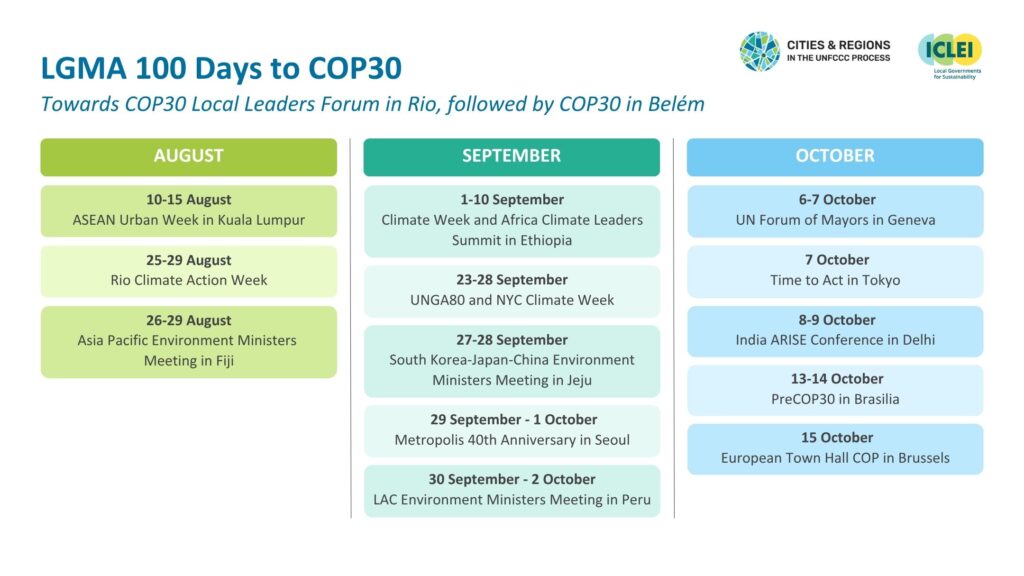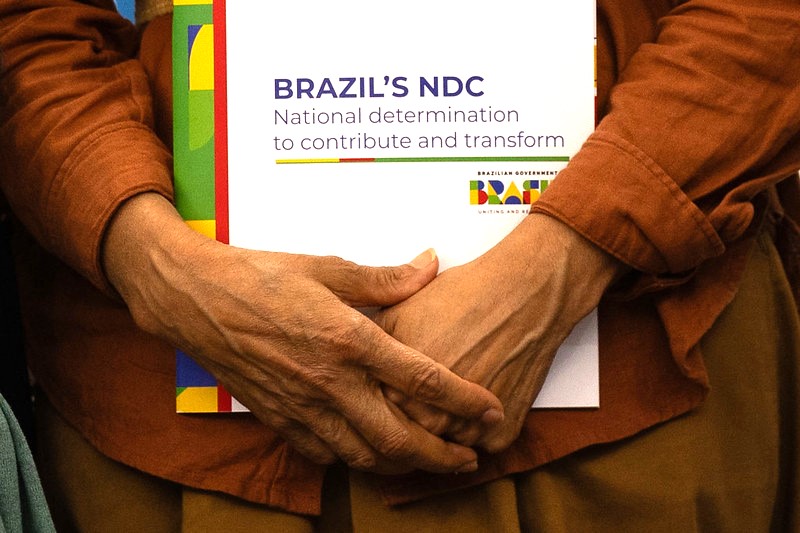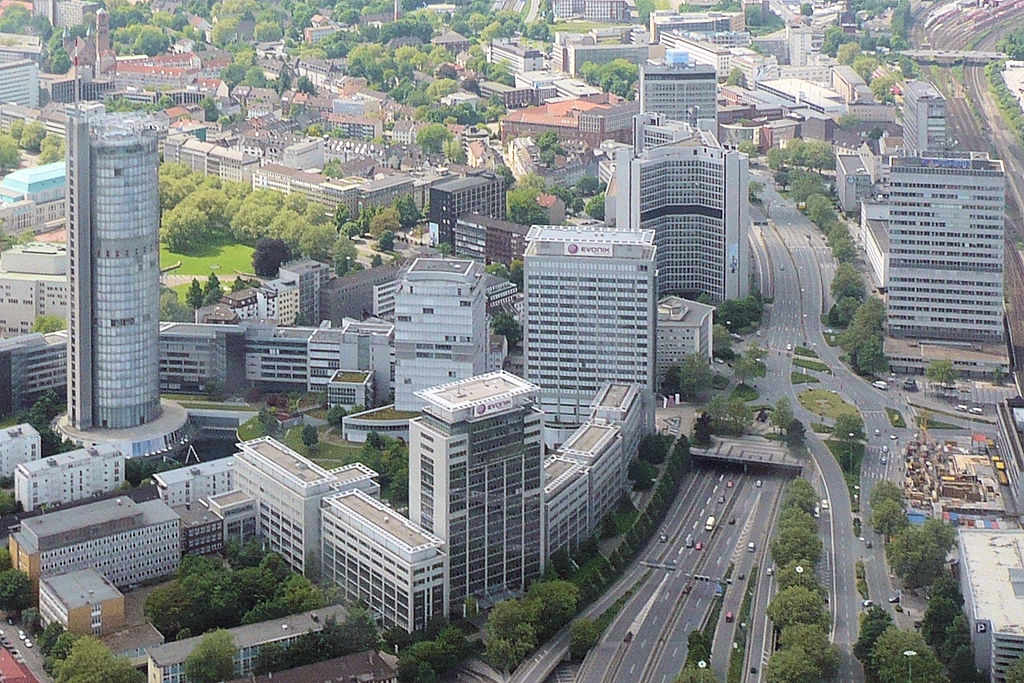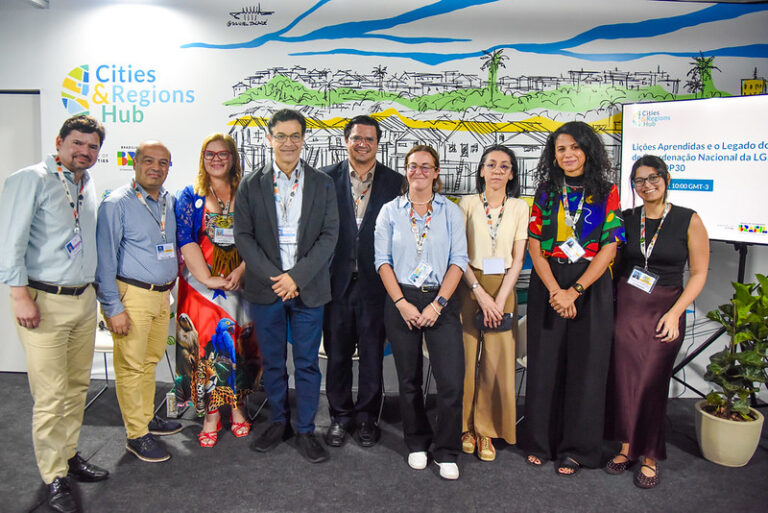What NDCs 3.0 are (and aren’t) saying about multilevel, inclusive climate action
As COP30 nears, will national climate plans finally reflect where climate action truly happens, in cities? With the third round of Nationally Determined Contributions (NDCs 3.0) underway, countries have a chance to raise the bar. Paragraph 161 of the COP28 UAE Consensus urges national governments to embed multilevel governance into their new climate plans to boost ambition and accelerate implementation. But with only 27 new NDCs submitted by June 2025, covering just 21% of global emissions, are governments actually delivering on that promise?
2025 marks a turning point for climate action. It is not only the year countries must submit updated NDCs, it’s also the 10th anniversary of the Paris Agreement. At the core of it are the Nationally Determined Contributions, which embody each country’s commitment to reduce emissions and adapt to climate impacts. These climate plans will shape global climate progress through 2035, and as UN Climate Change Executive Secretary Simon Stiell stated earlier in February, they are “among the most important policy documents governments will produce this century.”
Although the original submission deadline was February 2025, most countries are now expected to deliver their NDCs by the UN General Assembly in September. This revised timeline is intended to allow countries to strengthen ambition and alignment with long-term goals, such as reaching net-zero emissions by mid-century and keeping global temperature rise below 1.5°C, but it also raises concerns: Will the new NDCs truly raise ambition, or simply repeat old patterns?
Yet, as of June 2025, only 27 countries have submitted updated NDCs, covering just 21% of global emissions. Many major emitters, including the EU, India, and China, are still expected to deliver in the months ahead.
In addition, the weak climate finance outcome of COP29 has further complicated implementation. Without a strong financial commitment to back increased ambition, particularly in cities and vulnerable regions, the gap between planning and delivery risks growing wider. Global instability has further amplified these challenges. With the U.S. withdrawing from the Paris Agreement, its absence creates significant gaps in global climate finance and political leadership, making local and national multilevel action in other countries even more critical.
The urban content gap
Urban areas are responsible for over 70% of global greenhouse gas emissions and are at the forefront of both climate impacts and solutions. Yet, only 27% of NDCs include strong urban content, that is, concrete actions, targets, and coordination mechanisms tailored to cities. This was revealed in The Urban Content of NDCs, an assessment by UN-Habitat, the United Nations Development Programme and the University of Southern Denmark (SDU) analyzing the 194 NDCs submitted as of 27 June 2023.
The remaining 73% of national climate plans contain no, low, or only moderate levels of urban integration. This gap weakens implementation, delays funding for place-based solutions, and limits the potential to scale effective climate action through cities.
What ambition really means for cities
The UAE Consensus, adopted at COP28, emphasized the need to triple renewable energy capacity and double energy efficiency by 2030. But it also signaled a broader shift: A recognition that implementation must happen across all levels of government, urging Parties to engage in inclusive, multilevel, gender-responsive cooperative action, as well as in other relevant paragraphs of the UAE Consensus, providing direction for the next round of NDCs.
This spirit is embedded in the Coalition for High Ambition Multilevel Partnerships (CHAMP), launched at COP28 by the UAE Presidency. CHAMP now counts 75 endorsing countries committed to enhance cooperation with their local, regional and other subnational governments -including cities, towns, states and regions- to collectively pursue efforts on NDCs’ planning, financing and implementation.
Among the 27 countries that have submitted new NDCs, 12 are CHAMP endorsers. Of these, only four – Brazil, the UK, Canada, and the UAE – explicitly reference CHAMP in their climate plans.
According to statistics from the C40 x GCoM CHAMP supporting unit, some NDCs – such as those of Canada, Brazil, Kenya and the UAE – reference national governance structures, including the division of powers to legislate and implement climate action. Subnational content is most strongly represented in sections related to adaptation or specific sectors such as waste and transport. A few NDCs, like those of Norway and the UK, go further by detailing financial instruments available to support subnational climate action.
Brazil stands out. Submitted at COP29, its new NDC includes a bold new target: 59–67% reduction in emissions by 2035 (from 2005 levels). More importantly, it integrates “climate federalism,” recognizing the role of its 5,570 municipalities and 27 states in achieving climate goals. “Climate federalism is our response to the need for multilevel action,” said Antonio da Costa e Silva, Chief International Advisor at Brazil’s Ministry of Cities, during the SB62 and the Daring Cities Bonn Dialogues, last June 2025.
Ahead of submitting its NDC, Rwanda, another CHAMP country, is pursuing a nationwide consultation process to ensure its NDC 3.0 reflects urban priorities and aligns local development with climate response. Supported by WRI, ICLEI, and the GEF-funded UrbanShift program, Rwanda’s approach demonstrates how countries can translate commitment into collaboration.
Town Hall COPs: Bringing climate planning home
ICLEI’s Town Hall COP Initiative offers a powerful tool to support this transformation. These locally led dialogues are designed to bring the spirit of COP negotiations to communities, making climate planning more inclusive, participatory, and grounded in real-world needs.
Town Hall COPs are already taking place in countries like Malaysia, Türkiye, the United States, and across Latin America. By connecting local priorities with national targets, they offer a scalable way to deliver on CHAMP commitments and engage communities in shaping NDCs.
Even in non-CHAMP countries, Town Hall COPs can help communities mobilize, hold governments accountable, and push for stronger integration of local realities into national planning. A leading example is South Africa, the first nation to formally endorse the Town Hall COP Initiative as a platform for creating inclusive national climate plans. To bring this commitment to life, ICLEI and the South African Local Government Association (SALGA) have partnered to host a series of Town Hall COPs across the country.
A roadmap for national action
Cities are ready to lead, but they need enabling national frameworks. Without finance, mandates, and coordination, local ambition stalls. That’s why national governments must act now.
Developed by UN-Habitat and SDU, the newly launched guide Seizing the Urban Opportunity: A 3-step guide for strengthening Nationally Determined Contributions (NDCs) 3.0, presents a clear three-step approach for national governments to include subnationals perspectives into their climate plans:
- Assess the state of urban climate action, data gaps, and institutional roles.
- Prepare by identifying opportunities to align local and national priorities.
- Co-design the NDC through multilevel dialogues and shared ownership.
Urban-inclusive NDCs are not just more equitable, they are more effective. When cities and local governments are involved in designing national plans, those plans become more realistic, targeted, and implementation-ready.
Are we delivering on the promise?
Not yet. While some countries are leading the way, most NDCs 3.0 still lack the depth of multilevel, inclusive planning needed to drive transformation.
But the roadmap is clear. Cities are ready. The tools exist. The commitments are growing. What’s needed now is the political will to connect national ambition with local action.
As the voice of towns, cities and regions, and all other subnationals in the UNFCCC processes, the Local Governments and Municipal Authorities (LGMA) Constituency, has released its COP30 Vision Letter, calling all local and other subnational governments, along with their networks, to deepen and expand their engagement with national governments -through initiatives such as Town Hall COPs and CHAMP- to ensure that all UNFCCC Parties adopt their new generation of NDCs ahead of Belém.
Will the next round of NDCs finally unlock the full potential of multilevel climate governance? With COP30 fast approaching, the time to act is now. In order to accelerate efforts to enhance multilevel collaboration and urban components of NDCs3.0, the LGMA is kicking off an ambitious agenda in the 100 days to COP30. This starts with ASEAN Urban Week, hosted by Maimunah Mohd Sharif, Mayor of Kuala Lumpur, and member of COP29 International Advisory Board. The Malaysian government has critical roles for the urban agenda this year, as chair of the ASEAN Presidency in 2025 and President of UN Habitat Assembly until 2028.







